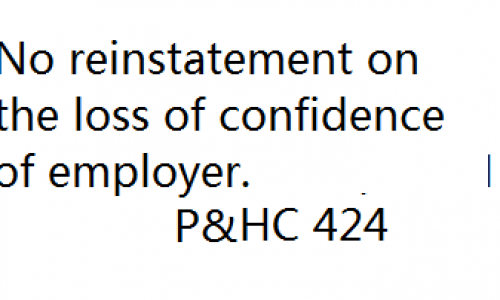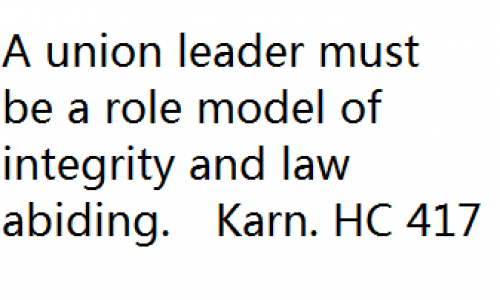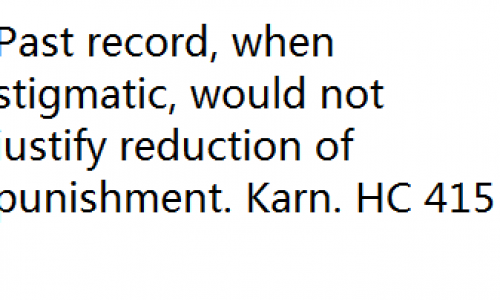2018 LLR 424
PUNJAB AND HARYANA HIGH COURT
Hon’ble Mr. Rajiv Narain Raina, J.
C.W.P. No. 2705/2017 Dt/–14-3-2017
Cafe Coffee Day
vs.
Ajay Kumar and Another
A. INDUSTRIAL DISPUTES ACT, 1947 – Sections 25F – Consequences of its violation while terminating the services of workman – Allegation was of turpitude – Workman was caught taking two cups of coffee without cutting bill, cheating customers by putting less quantity of ingredient thereby bringing a bad name to the Company – He was issued show cause notice to report at Regional office but he failed to report there in spite of repeated reminders – On being caught red handed, workman wrote a ‘letter of apology’ and thereafter abandoned his job – Workman sent demand notice on the same day – Conciliation proceedings failed – Labour Court held the termination as illegal – Instead of reinstatement compensation of Rs.80,000/- was granted – Management challenged the award in writ petition – Held, management was duty bound to make compliance of Section 25-F of the Act – Due to non-compliance of provisions of the Act, the termination is illegal, making the workman entitled to reinstatement with back wages. Para 14
B. INQUIRY – Consequences of non-conducting of inquiry before termination of services of a workman – No charge sheet was issued – No inquiry was held – Termination was illegal being in violation of principles of natural justice. Para 14
C. COMPENSATION – In lieu of reinstatement – Workman was charged with defalcations of unlawfully selling the food stuff of the management without issuing bills and of low quality – If the Management had lost confidence in the workman then the Labour Court avoids to grant reinstatement even if the termination is illegal due to technical lacunas – In such circumstances lumpsum compensation in lieu of reinstatement with back wages is appropriate.
Para 10 to 12
D. ABANDONMENT – When plea of abandonment not justified – Management asserted that workman had developed a bad habit of stealing – But such assertion of the management is without any past misconduct of stealing in the written statement – Workman must have been frightened due to which he abandoned the job – Running away is not proof of abandonment without repair effort by both parties – Management neither sent any letter to the workman for resuming his duty nor conducted any inquiry in this respect – Hence, plea of abandonment not sustainable.
Para 7 and 10
For Petitioner: Mr.Puneet Sharma, Advocate.
For Respondents: None.
IMPORTANT POINTS
• Termination of services of a workman without compliance of Section 25-F of the Industrial Disputes Act, 1947, is illegal, making the workman entitled to reinstatement with back wages.
• Non-conducting of inquiry before effecting termination of services of a workman on account of misconduct of turpitude of stealing goods of the company, is illegal being in violation of principles of natural justice.
• If the Management had lost confidence in the workman due to misconduct of turpitude on his part, since such a termination is illegal due to technical lacunas, a lumpsum compensation in lieu of reinstatement with back wages is appropriate.
• Labour Court avoids to grant reinstatement when the Management had lost confidence in the workman due to misconduct of turpitude on his part.
• The assertion of the management that workman had developed a bad habit of stealing the goods of the company, without any past such incident of misconduct of stealing in the written statement, is not sustainable.
• Only plea of ‘running away’ is not proof of abandonment without repair effort made by the management by sending communications to the workman to resume his duties or his unauthorized absence will be treated as that he has abandoned the job on his own accord.
JUDGMENT
RAJIV NARAIN RAINA, J.—1. The challenge in this petition is to the award dated September 12, 2016 made in Reference No.07 of 2014 which has been answered partly against the management and partially in favour of the workman. Reinstatement has been denied and in lieu thereof compensation by lumpsum payment of Rs. 80,000 has been awarded with a finding of wrongful termination of service. The facts of the case are to the following effect:
2. The workman was employed by Cafe Coffee Day at its outlet in Gurgaon on April 21, 2008 in the position Team Member Level-2. His services were terminated on June 12, 2013 without issuing chargesheet or holding an inquiry or following the procedure prescribed under Section 25F of the Industrial Disputes Act, 1947 (“1947 Act”) as no notice or pay in lieu of notice was given to him nor any retrenchment compensation was paid at the time of termination for five years service.
3. The defence of the management was that the workman absconded from duty after being caught taking two cups of coffee without cutting bill and for cheating customers by putting less quantity of ingredient “D.S. material” and passing of the sub-standard cup of coffee to customers thereby bringing a bad name to the company. He was issued show cause notice on June 18, 2013 to report at regional office but he failed to proceed thereto and report his presence in spite of reminders sent. The management stated that on being caught red handed, the workman wrote a letter of apology on the same day, handed it over and thereafter abandoned his job.
4. Nevertheless, the petitioner workman raised a dispute by serving a demand notice on the management on the same day as the show cause notice was issued to him i.e. On June 18, 2013. The dispute could not be resolved in conciliation proceedings which failed and a report was submitted by the Labour Commissioner to the appropriate Government which referred the dispute to adjudication by the Labour Court-I, Gurgaon. The statement of claim and defence were exchanged in the trial before the Court including filing the rejoinder.
5. The respondent-workman appeared as his own witness and relied upon document Ex.P-2 in support of his case. The management produced two witnesses and relied on the document Ex.RW-2/A in support of its case and closed the evidence. It was contended by the authorized representative of the workman that Section 25-F of the 1947 Act had been violated and, therefore, the termination is illegal. The management pleaded serious misconduct committed at Cafe Coffee Day as mentioned above. He was issued show cause notice but did not turn up for further action by the management and it was assumed that he had abandoned his job.
6. The employer and employee relationship was admitted, therefore, no evidence was required. The management pleaded that show cause notice was sent to the workman by registered post to report for duty but he never came forward. The postal receipt is dated June 19, 2013. Significantly, the demand notice was issued on June 18, 2013 one day prior to the posting of the show cause notice. The Labour Court inferred from this sequence of events that the show cause notice was a counter blast to the demand notice to cover up the previous act of termination prior to issue of show cause notice. The management did not produce any other documentary evidence to prove that the workman abandoned his job.
7. The gap being extremely narrow between termination and demand notice the question of abandonment does not arise since it is an inference drawn from wrong absence which is not the case. Even running away is not proof of abandonment without repair effort by both parties.
8. If the workman had committed misconduct then a short but reasonable inquiry into the allegations should have been conducted to establish guilt of not obeying command to report to regional office, if not for what he did at Cafe Coffee Day, or even on account of his unauthorized absence from duty. Since no inquiry was held then the provisions of Section 25-F of the 1947 Act had to be complied with before terminating the services in absence of compliance or so the Labour Court thought. The Labour Court held the termination to be illegal. Having reached this conclusion, the Labour Court in para.13 without any discussion as to why reinstatement should not be ordered converted the case into one of compensation and deemed it fit to award compensation to the tune of Rs. 80,000 only as adequate package for wrongful termination.
9. Without commenting on the conversion to a case of compensation I would find hardly any reason to disturb the award at the hands of the management. It has been strenuously argued by Mr. Puneet Sharma, learned counsel that this is neither a case of reinstatement nor a case of compensation since the petitioner was caught red handed fixing coffee and bringing the fair name of Cafe Coffee Day to ill-repute in the community of its customers. It is not so much the amount of compensation that disturbs the management, he urges, as the precedent it may set for the company. If the management had lost confidence in the workman then the Labour Court has not awarded reinstatement so the management has nothing to worry about on this account. As far as quantum of compensation is concerned it appears on the lower side given that the workman had put in five years of service without any earlier act of omission or commission involving misconduct on his record.
10. A visit to the statement of defence put in by the management before the Labour Court the same reveals that the charge against the workman was that he was caught on the wrong foot indulging in malpractices/ misconduct of preparing food articles and not making a bill for those food articles and of using excess DS, which is the prime ingredient for making Frappe Coffee. In other words, he had saved some ingredients to prepare another cup of coffee to sell and keep the sale proceeds. He was charged with defalcations of unlawfully selling the food stuff of the management without issuing bills and of low quality. The workman had accused of having used less than the required quantity and thereby selling low quality food and by this act he had cheated both the employer and customers from whom the workman had obtained cash without issuing bills. He must have been frightened and, therefore, abandoned his job. The management asserted that the workman had developed a bad habit of stealing and indulging in misconduct and he was found to be caught sooner or later. But there is no pleading of past misconduct with material particulars incorporated in the defence statement.
11. In the rejoinder the workman denied the allegations and stated that a totally false story was foisted on him.
12. For these reasons, Mr. Puneet Sharma, learned counsel argues that award of Rs. 80,000 if upheld will put premium on misconduct. Besides he has produced Ex.R-1 in Court. It is a handwritten letter
allegedly by the workman to the effect:—
“Dear Sir,
Today visit our Regional Manager in our Cafe. Hefound D.S. Excess and two Frappe without kofe bill.This is my last mistake. Kindly give last opportunity for my job.
Thank
Ajay
C.7808”
13. Mr. Sharma though has not produced the contract of employment but when asked has produced the same which is exhibited on the record of the Labour Court. He refers to Clause-1 which deals with probation and Clause-4 (c) which deals with termination. The initial appointment on probation was for six months which could be further extended at the discretion of the company depending upon performance. The probationary period could be extended at the discretion of the management which extension had to be communicated in writing. On the satisfactory completion of period of probation or any extended period thereafter, the employee could be confirmed in writing by the management. If there is no confirmation in writing he would be deemed to be on probation. From this clause it is argued that the workman was on probation because there were no confirmation letter issued but while he argues this point Mr. Sharma skips para.2 of Clause 1 which requires that extension will be communicated in writing. When asked if there was any writing to this effect Mr. Sharma says that he can only seek instructions. If there is no such letter in documentary evidence before the Labour Court then none can be looked into at this stage and the effect of non-communication of the first extension and the other extensions for five years leave carries with it a serious doubt as to whether he was a confirmed employee or still on probation at the time of termination.
14. I do not see how this argument has any significance or legal value in the face of the provisions of Section 25-F of the 1947 Act which define retrenchment may be brought about for any reason whatsoever. The management was duty bound to comply with the provisions of Section 25-F of the 1947 Act failing which it could support its case only if there was a charge sheet or an inquiry held, even fact finding or preliminary with reasonable opportunity to the workman to prove his innocence, and termination followed as a consequence in accordance with law then compliance of Section 25-F was not required. So far as Clause 4 (c) is concerned it empowers employer to terminate services at any time. It stipulates that If the employee’s conduct renders himself incompetent to perform duties and is found to be dishonest, disobedient, intemperate, irregular in attendance or breaches any of the terms of the appointment letter or any of its conditions specified therein for any offence involving turpitude the company shall have right to terminate employment forth with without any notice and payment due, if any, will be deducted from salary.
15. I fail to see how this provision helps the case of the management when it did not hold inquiry into allegations of turpitude. Turpitude is defined as a depraved or wicked behaviour or character. The expression is synonymous with wickedness, immorality depravity, corruption, vice, degeneracy, evil, baseness of character and vileness. If one goes into these niceties it would lead us nowhere in the facts and circumstances of this case and what this Court is called upon to do in exercise of judicial review of an award of the Tribunal which ex facie suffers from no error or legal infirmity.
16. I would not in the conspectus of facts and circumstances with the award in one hand and the evidence in the other, find that this case is not fit for interference and would dismiss the petition in limine.



